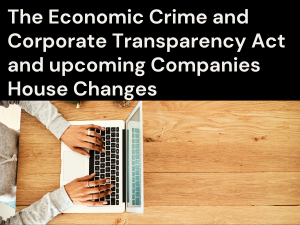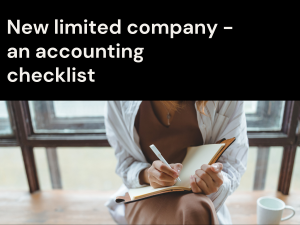What is corporation tax?
Corporation tax is a tax that Limited companies in the UK pay on their profits. It is a tax calculated on the annual profits of the business, which essentially makes it a type of income tax only applicable to a Limited Company. Corporation tax is not applicable to Sole Traders or businesses operating through a Partnership, who instead simply pay income tax.
How is corporation tax calculated?
A limited company will pay corporation tax on its annual taxable company profits. This will include any trading profits which have arisen from doing business along with profits realised on the sale of investments or assets. It is paid in the form of a company tax return, and businesses must be the ones to inform HMRC about how much corporation tax they owe.
There is no tax-free allowance for companies, meaning small businesses need to pay corporation tax on any profits in the business. However it is important to note that companies pay tax on their taxable profits. There are times where taxable profits and the profits per the company’s annual statutory accounts will differ. That’s because there are a number of adjustments required for tax purposes.
This is where a Chartered Accountant or Tax Advisor (like us!) can help you to ensure that the corporation tax for your small business is correctly calculated and that you are maximising all available tax deductions across your set accounting period.
What is the UK corporation tax rate for 2022?
The current rate of corporation tax is 19%. This means in 2022 your small business will pay corporation tax at a rate of 19% on your taxable profits.
The Chancellor announced in March 2021 that the current rate of corporation tax will remain at 19% until 31 March 2023.
What are the UK Corporation Tax Rates for 2023 onwards?
Currently, the UK corporation tax rate is expected to rise to a maximum of 25% for periods commencing after 1 April 2023. However, it is slightly more complicated than this because from 1 April 2023 the rate of corporation tax that a company pays will vary depending on it’s profits. For small businesses with profits of less than £50,000 they will continue to pay corporation tax at 19%. For companies with profits of £250,000 or more, they will pay corporation tax at the new headline rate of 25%. For companies with profits between £50,000 and £250,000 the rate of corporation tax will be tapered i.e. somewhere between 19% and 25%. The Chancellor has not yet announced the taper thresholds.
How do I file a corporation tax return?
Each year, a company must prepare statutory annual accounts and file these with Companies House. These accounts form the basis of the your small business’s corporation tax return, or CT600. A company should use these annual accounts to prepare it’s corporation tax return. In reality, most companies ask their accountant or tax advisor to prepare the tax return at the same time they prepare the annual accounts.
One of the reasons companies ask their accountant to help is because corporation tax returns must be filed online and require special software for doing so. Your corporation tax return will include all the details HMRC require to review and process your return, including company details such as name, tax reference and registration number along with turnover, profit and details of allowances and reliefs claimed.
What is the deadline for filing my corporation tax return?
A company usually has 12 months after its year end to file its corporation tax return. So as an example, a small business with a 31 December 2020 year end would have until 31 December 2021 to file the corporation tax return.
But it is essential you read the next section – when is my corporation tax due for payment – because whilst companies have 12 months to file a return, the corporation tax usually has to be paid earlier than this!
If a company does not file its corporation tax return by the deadline HMRC will charge a late filing penalty.
The penalty charged depends on how late the return is. If a return is one day late HMRC will charge a £100 fine. For returns which remain more than three months late a further £100 fine will be charged. Where returns are still outstanding six months after the deadline HMRC will assess what it considers to be the corporation tax liability and require this to be paid with a 10% penalty. When 12 months overdue, a further 10% penalty is charged on top of the estimated tax bill.
When is my corporation tax due for payment?
Corporation tax payments are usually due 9 months and 1 day after a company’s year end. Large companies with more than £1.5 million in profits must pay corporation tax in instalments but we’ve not considered this here so if that’s relevant to you please contact us.
So, continuing the example above, a small business with a 31 December 2020 year end would have until 1 October 2021 to pay its corporation tax bill.
It is therefore essential that you understand the different deadlines for paying your corporation tax and filing your corporation tax.
Where you pay your corporation tax bill late HMRC will charge interest on the amount you owe. They may also charge a penalty or surcharge. We do not advise late payment of corporation tax as HMRC do often look to enforce payment using debt collection agencies. If a company is unable to pay it’s corporation tax bill then we highly recommend entering a time to pay arrangement with HMRC and setting up a payment plan.
What if you corporation tax bill is nil?
Even when you have nothing to pay it is still necessary to file a corporation tax return with HMRC. This tax return will show HMRC how you have calculated your nil liability. Where there is no corporation tax to pay we generally recommend filing the return within 9 months of the year end as this notifies HMRC no payment is due. Otherwise, HMRC may chase payment not knowing that the corporation tax due is nil. To resolve this you can notify HMRC separately, but filing the return early is usually a simpler process.
How do I pay my corporation tax bill?
When it comes to paying corporation tax, there are a number of ways you can pay your corporation tax bill, including by Bacs, debit or corporate credit card and direct debit. The simplest way, and how most of our clients pay their corporation tax bill, is by Bacs.
When you pay by Bacs you will either pay HMRC Cumbernauld or HMRC Shipley’s bank account. Check to see if HMRC have sent you a payslip with details of where to make your payment. If you’re still in doubt it’s recommended that you pay HMRC Cumbernauld’s account.
It is essential you quote your unique 17 character payment reference – this can usually be found online through your HMRC portal, from your accountant (if they have agent access) or again on any payslip HMRC have sent you. If you don’t quote this reference HMRC will not know where to allocate the payment and may allocate it to the wrong company or wrong period.
How do I reduce my corporation tax bill?
Well, if only we had a pound for every time someone had asked us that question! The simplest way to reduce your corporation tax bill is use an experienced Chartered Accountant (like us!) or Tax Advisor, who can maximise the reliefs and deductions your entitled to.
Using our tax efficiency service, we assess tax deductible expenses such as national insurance contributions to save you money at the end of every financial year. We can also help you maximise your business expenses with tax deductible items. By assesing things like salary bands and dividend income we help to keep you as tax efficient as possible. And we’re so confident we’ll have saved you money that we’ll give you an annual statement at the end of every tax year showing you just how much we’ve saved you. Find out more here.
If you prefer the DIY approach, check out:
- Practical guide for business owners which includes 23 ways to reduce your tax bill.
- Why you should make sure your mobile phone is in the company name.
- How to maximise director pension contributions.
Conclusion
So that really does cover everything you need to know about the mechanics of corporation tax for businesses, who pays it, how it is calculated, what the deadlines are, how to pay it and how to reduce your corporation tax bill. If you have any questions then get in touch with us, we’d love to help you maximise your tax reliefs and reduce your corporation tax bill.






